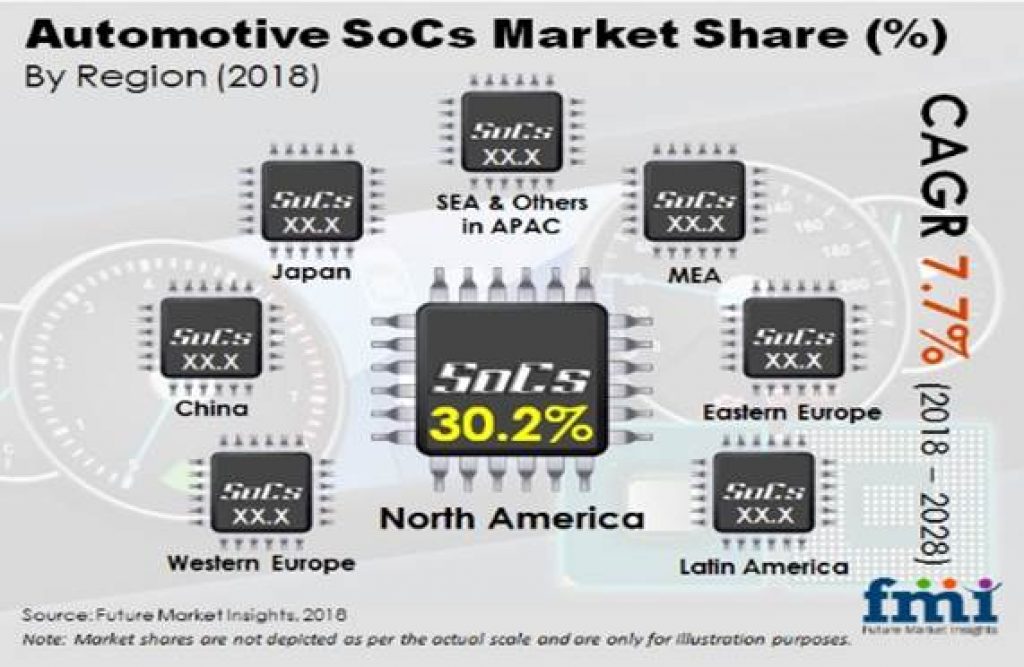August 29, 2018 – Increasing electrification of automobiles coupled with government initiatives and technological advancements promoting safe driving are crucial factors accelerating the demand for automotive systems-on-chips (SoC) in the coming years. The global automotive SoC market was valued at US$ 12,007.6 Mn in 2017. However, considering that the engineering marvel- autonomous cars have captured the attention of many in the automobile landscape, the global automotive SoC market is likely to expand at a significant CAGR of 7.7%, standing at an estimated market valuation of 26,800.5 Mn by 2028.
In terms of application, infotainment systems will dominate the automotive SoC market, with approximately 63% of the total market share. Advanced driving assistance systems (ADAS) segment, is expected to grow at maximum CAGR during the forecast period. Deployment of automotive SoC is projected to remain high in passenger cars through 2028.
Automotive SoC Market in for a Notable Growth Phase through 2028
In a recently released intelligence outlook by Future Market Insights, the global automotive SoC market will exhibit a high growth rate – predominantly driven by technological advances and an expanding application base of automotive SoC, especially in electric/hybrid cars. FMI also marks rapid technological advances enabling near-real time object identification to continue fueling the growth of automotive SoC market through 2028. Increasing demand for connected cars and government regulations guarding the connected car ecosystems are decisive factors impacting the demand and adoption of automotive SoC, globally.
Increased R&D and Vehicle Electrification Key Factors Fuelling Automotive SoC Adoption
Leading automakers are investing in R&D of vehicle automation to meet the consumer demands and provide a seamless in-car and driving experience. Advancements including speech recognition, audio and video sensing, image compatibilities, GPS and radar capabilities, advanced driver assistance, advanced security and safety, and IC-integrated LED front lighting, all play a crucial role in vehicle automation, which are integrated using SoC. Another factor projected to fuel the adoption of automotive SoC, is the increasing electrification in hybrid and electric vehicles. Cellular technologies and telematics are widely adopted as a means to stay connected in autonomous cars.
Government Initiatives Supporting Electric Vehicles Production to Strengthen Automotive SoC Market
Governments are taking initiatives to promote and expand the manufacturing sector. Moreover, they are also reducing regulatory complexities to enhance manufacturing efficiency. Initiatives to improve vehicle emission levels and fuel-efficient systems are also picking pace. Such government initiatives are supplementing the production of electric and hybrid vehicles, and attracting global companies to invest in the semiconductors industry and related integrated chips, further consolidating the growth of automotive SoC market globally.
Growing Demand for Luxury Commercial Vehicles to Create Investment Opportunities for Automotive SoC Manufacturers
On the other hand, dynamic import tariffs and taxes imposed on electronic instruments and consumer electronic goods in regions like North America, Asia Pacific, and Western Europe, is affecting the sales of semiconductors and related electronic chips in these regions. Decreasing sales of semiconductors and other chips is projected to restrain the automotive SoC market, globally. In terms of opportunities, growing demand for luxury commercial vehicles in regions such as North America, Europe, and Asia Pacific is creating huge market opportunities for automotive SoC manufacturers. Top manufacturers such as VOLVO, Daimler/Chrysler, and Bharat Benz are focusing on next generation driving experiences in their commercial vehicles, integrated with SoC. Automotive SoC provide storage space for rich infotainment multimedia data, advanced software and applications, among other benefits.
For More Information: https://www.futuremarketinsights.com/reports/sample/REP-GB-7247


